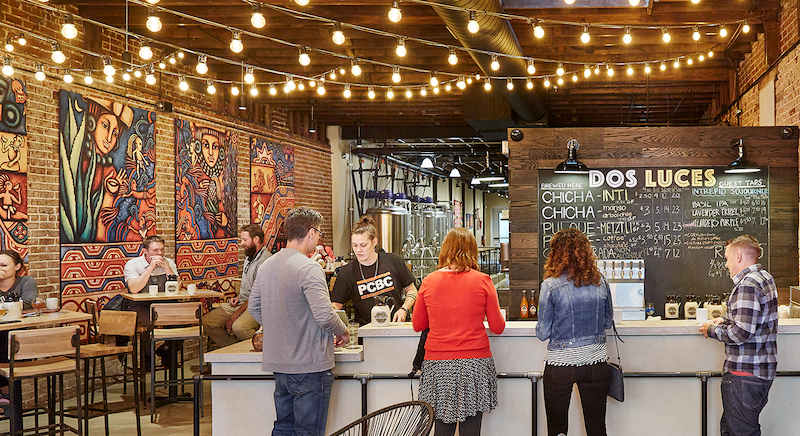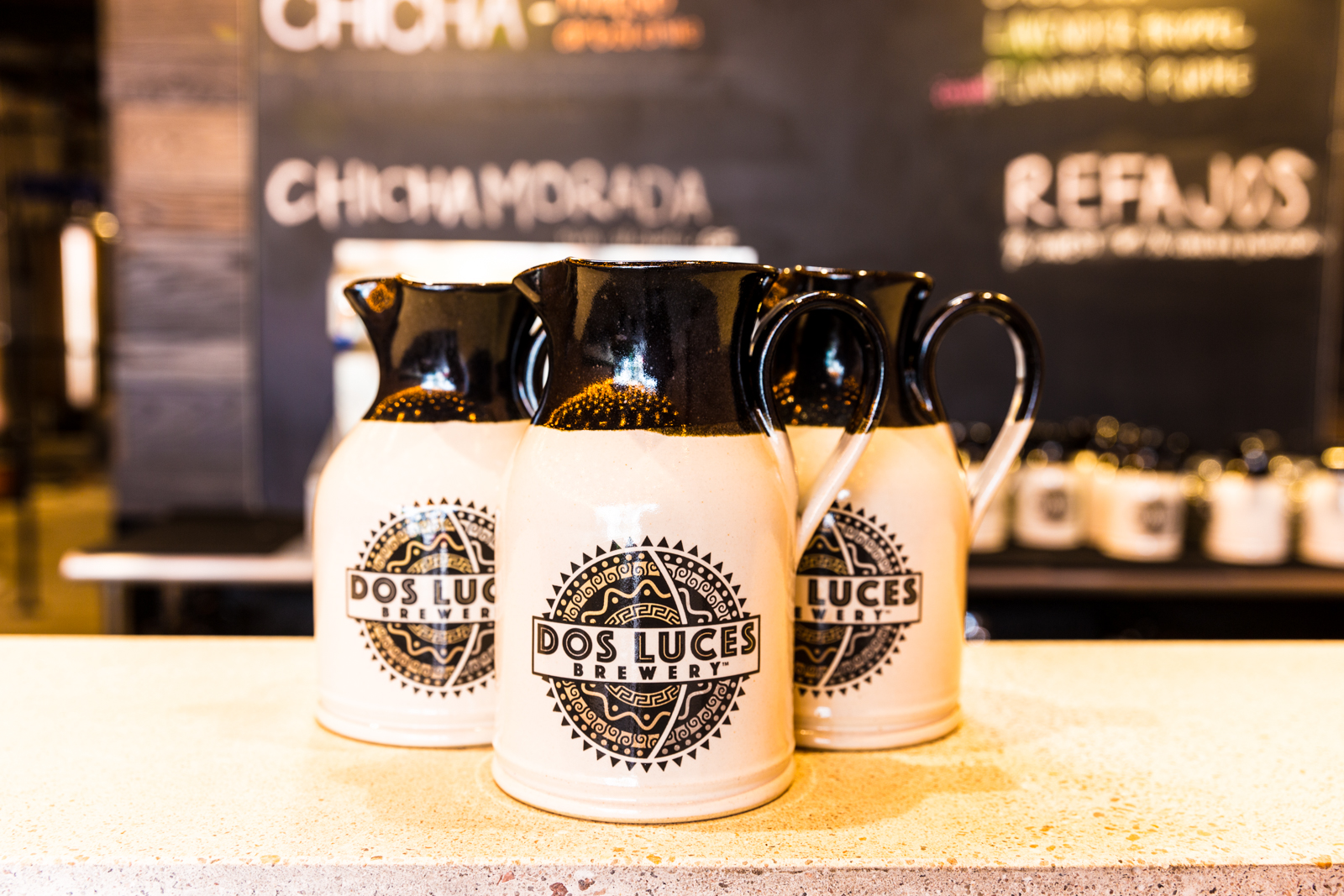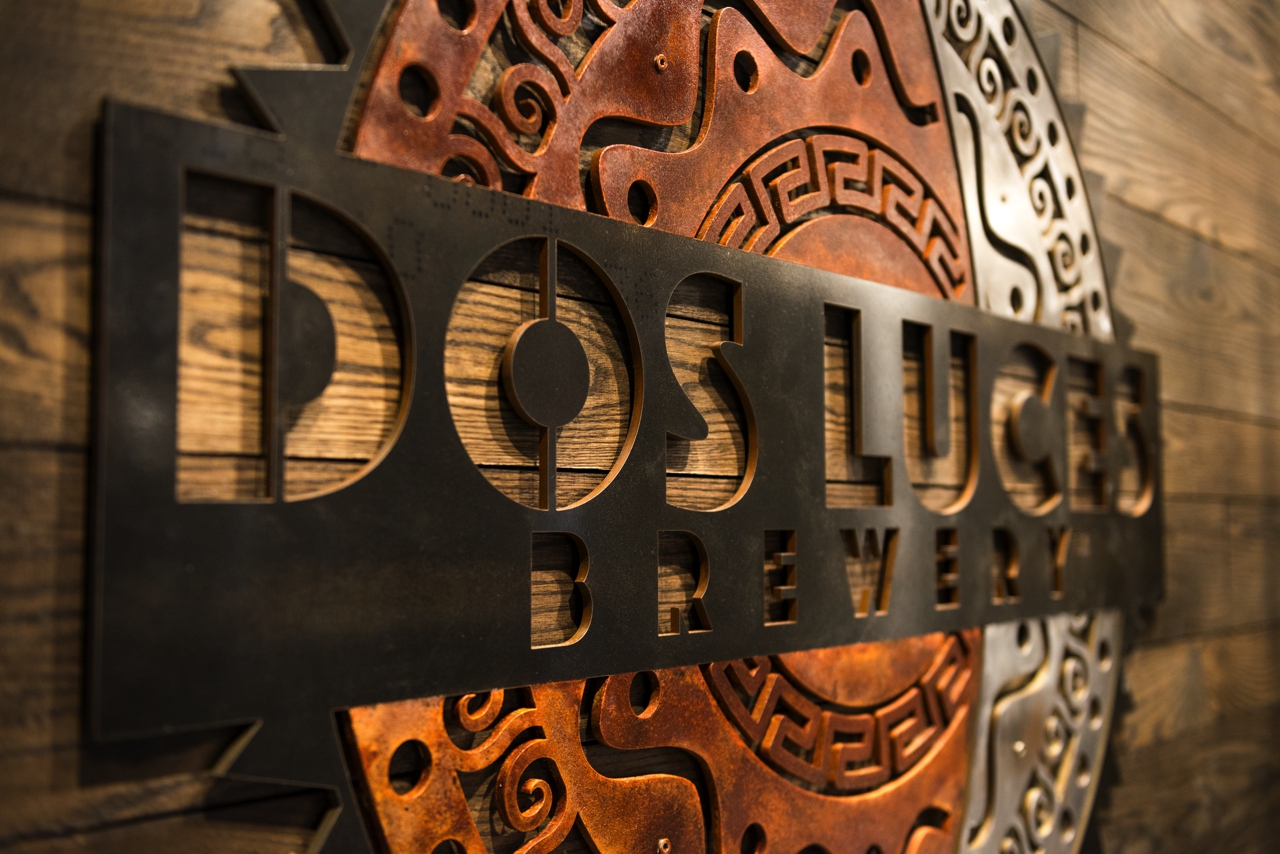Judd Belstock wants to expand the way Americans think about beer.
“If conquest had gone the other way, we’d have 150 different categories for chicha and one for European beers,” says Belstock, co-founder and brewer for Denver’s Dos Luces Brewery. Dos Luces specializes in the indigenous Central and South American beer styles of chicha and pulque. Most beer drinkers haven’t even heard of these styles—and if they’ve heard of chicha, it’s likely connected to sensational stories about the role of mastication in the beer’s production.
Chicha is made with corn, and until about half a century ago, the starches in that corn were converted into fermentable sugars through the enzymatic work of human saliva. That’s no longer the case, but Belstock still gets asked if he chews the corn for his beers. His typical response epitomizes his sardonic sense of humor.
“No, but I’ll spit in your beer for a dollar.”

Reclaiming America’s Ancient History
Dos Luces Brewery was founded not only to preserve the heritage of chicha and pulque, but to establish both as distinctly American styles. The brewery was founded by Belstock and Sam Alcaine, professor of fermentation science at Cornell University. It opened in Denver’s South Broadway neighborhood in 2018.
“Our mission is to change the way people think about beer,” explains Belstock. “We want to use American ingredients and styles from before European conquest and make them a part of everyday beer culture in the United States.”
Belstock spent over a decade working for Coors and then Miller followed by three years at Boulder Beer Company before starting Dos Luces. His interest in ancient American beers initially came from his father.
“My goal eventually is that if you walk into a great beer bar with a lot of taps and they don’t have a chicha and a pulque on draft, they’re doing it wrong.”
“My dad was living in Peru in the late ‘60s while serving in the Peace Corp, and he drank a lot of chicha and told me about it when I was growing up,” he explains. “When he was having a beer, he’d pour a little out for [Incan goddess] Pachamama, which is the tradition in Peru.”
Alcaine is the son of Salvadoran and Cuban immigrants, and, as Belstock explains, specializes in “fermenting things that are not intended to be fermented.” The two tried their first pulque together when they found a can in a liquor store in Chicago while both were working for Miller.
“It was pretty bad,” Belstock says with a laugh, but it got the wheels turning.
Pulque, a Priestly Aztec Drink
Pulque is an ancient Aztec drink brewed with corn and sap from the maguey plant, a type of agave. The drink was a sacred beverage in Aztec culture.
“Pulque was reserved for the priesthood and for special ceremonies,” explains Belstock. “It was considered a gift from the gods. If you were about to be sacrificed, you got two cups of it before you went.”
Despite being brewed for thousands of years, pulque nearly went extinct in its homeland. The Austrian colonists who took over Mexico during the American Civil War actively disparaged the drink and made it all but illegal. Fortunately, the drink has seen a resurgence over the last five years in Mexico.
“Pulquerias have been popping up in Mexico City the way craft breweries have here,” says Belstock.
In addition to the Colorado blue corn malted for Dos Luces by nearby Grouse Malt House, the brewery uses maguey sap from Villa de Patos farm in Mexico. To harvest maguey sap, the farm cuts a hole in the bottom of the plant and collects the sap overnight. Over about 30 days, this will yield enough sap for one batch of pulque at Dos Luces. This slow collection process brings a good deal of native microflora along with it, and the brewery has harvested its house bacterial culture from the sap.
Chicha, the Peruvian Homebrew
Malted blue corn forms the base of the brewery’s Chicha as well, and the malting process provides enzymes that make it unnecessary to use human spit to brew the beverage. Chicha is an ancient Incan beer from Peru, and while it had a ceremonial role much like pulque, it wasn’t reserved for the elites.
“It’s never been that uncommon to brew chicha in the home,” explains Belstock. “It was much more of a common person’s drink.”
That homebrewing heritage protected chicha from the extinction pulque nearly suffered.
“Chicha never really went away,” reports Belstock. “It’s just been limited to the mountains primarily and made mostly in people’s homes. Since the time of the Inca, you would put a flag in front of your house indicating that you had chicha available for sale.”
While historical chicha used the notorious chewing method for acquiring conversion enzymes, techniques have modernized. Belstock says even traditional homebrewers in Peru are using sprouted or malted corn now.

From Ancient Beverage to Modern Beer
Belstock is passionate about helping people appreciate the long history of chicha and pulque, both of which are a bit sour and mildly spiced.
“With both of these beverages, the history goes back at least 3,000 years based on pot shard evidence,” he says. “But the Inca and the Aztec don’t go back that far. There were cultures that predated both of those cultures that made beers from corn and maguey, respectively.”
While that history is rich and worthy of attention, he stresses the importance of not treating these styles as mere historical artifacts or quaint diversions.
“When we treat these as curiosities and historical anachronisms, then that pigeonholes them. It makes them interesting other things rather than being part of our culture, which they should be.”
Making these beers part of our American drinking culture requires public education, and that often happens one drinker at a time. A lot of people who walk into Dos Luces have never heard of the beer styles they produce.
“We have a lot of people who come in and just see the word ‘brewery’ and don’t know what we’re doing,” says Belstock. “They’ll come in and say, ‘I’ll have the IPA.’ Well, we don’t have an IPA, but let me tell you about what we do here. There are a few who will walk out at that point, but most people who try it do like it.”
He says the experience people have inside the taproom is generally superior to those tasting the beers elsewhere, because the education component is so important. He also leads educational tasting classes to increase public understanding of his beers.
“My goal eventually is that if you walk into a great beer bar with a lot of taps and they don’t have a chicha and a pulque on draft, they’re doing it wrong,” he says.
Dos Luces has also collaborated with other Latinx-owned breweries likes Atrevida and Border X to bring attention to these and other Latin American brewing traditions.
Doc Luces: Two Lights
Belstock’s chicha is named Inti after the Incan god of the sun. His pulque is named Metzli after the Aztec god of the moon. Those two lights, or “dos luces,” are guides for this brewery making ancient beers for a modern audience.
“Those are the two lights in our name, but we also like to say the light of the past is showing the way for the light of the future,” Belstock reflects. “We’re taking inspiration from the past to create something entirely new.”
CraftBeer.com is fully dedicated to small and independent U.S. breweries. We are published by the Brewers Association, the not-for-profit trade group dedicated to promoting and protecting America’s small and independent craft brewers. Stories and opinions shared on CraftBeer.com do not imply endorsement by or positions taken by the Brewers Association or its members.


Share Post